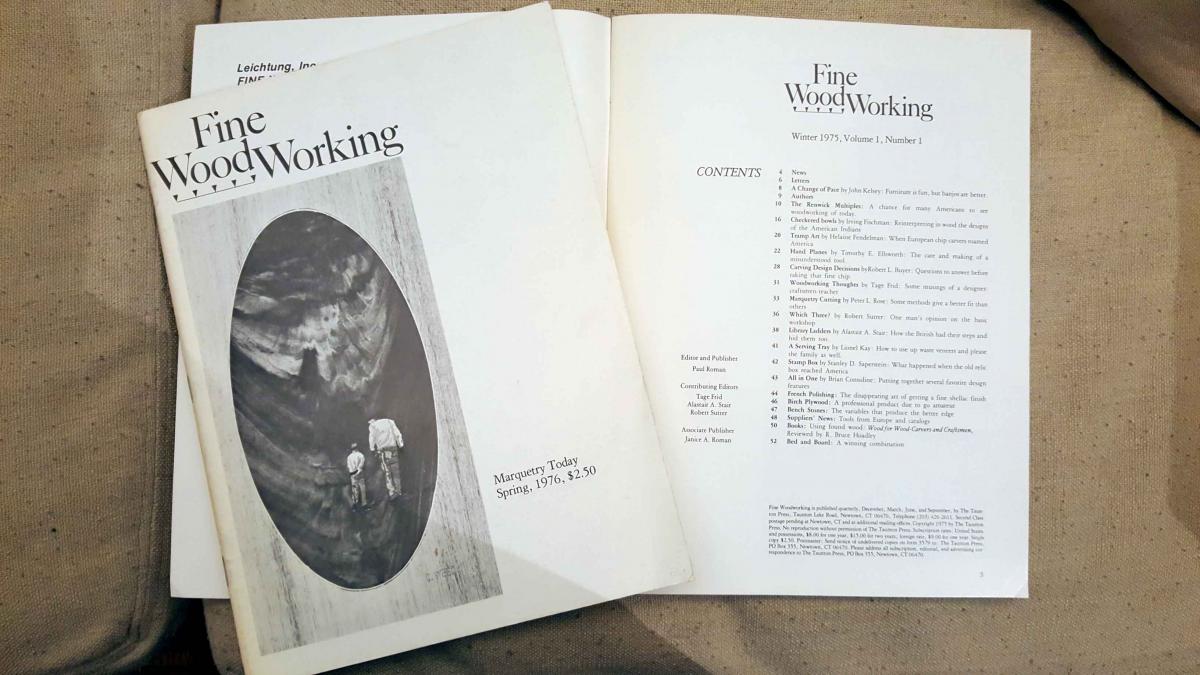
Thirty years ago it was fairly common for students to have classes in some sort of craft in high school. Arts ‘n’ crafts for younger kids, and as kids got older, probably home ec for the girls and shop for the boys (and all three for the lucky minority). This probably included woodworking instruction. This experience meant, among other things, that the idea of making something wasn’t alien or a big reach. Nowadays Steiner/Waldorf schools continue to teach craft, but by and large most public and private schools don’t. The underlying reasons are varied, but crafts courses of all kinds have disappeared from schools, and consequently most young people start out totally disconnected with the maker world.
And thirty years ago if you had the urge to make something and your friend-relative-teacher-neighbor couldn’t help you, the only information available was through a half dozen national magazines like Popular Mechanics, Popular Woodworking, and Fine Woodworking. Specialty and niche publications existed, but the smaller magazines did not have a ready access to distribution and they took some looking to find. The larger magazines functioned as a introduction to setting up a full shop and doing mainstream projects. Of course they all tackled projects with specialty techniques, but the magazines were generalists in orientation. If you had the urge to get more involved in a specific area of woodworking, the magazines were where you could find out about other smaller specialty magazine, woodworking clubs, and of course classes.
I remember that one of the appeals of Fine Woodworking when it first came out in 1975 was that it addressed niches (see table of contents in the photo above). While the other mainstream magazines of the day were focused on how to build practical furniture, mostly in neo-colonial or Shaker style, Fine Woodworking's interest and focus was about traditional techniques that were still being practiced, and how you could do them too. Of course, over the years what was unusual at the time has become usual, with the result that someone whose says their hobby is "woodworking" can mean anything from building simple pieces, fancy bentwood, to carvings, turnings, or all sorts of complications.
Then along came the internet!
We aren’t going back to the old way. Someone with the urge to make something can totally bypass the traditional furniture route. We meet a lot of turners, spoon makers, carvers, and chair makers, some of whom have branched out or will branch out to other types of woodworking. For most of them, the traditional path never comes up. The internet has made resources - the knowledge, the community of clubs, both in-person and virtual, the tools themselves - accessible with limited gate keeping.
In the pre-Internet days, information about a new group, a new toolmaker, a new source of tools and equipment might take years to circulate - sometimes too late, if the new thing folded before getting sustainable amount of support. Today this is not the case. This access to information will be what enables all sorts of woodworking to continue.
All this information affects the type of woodworking people will do because the leap for someone who has never had a shop class to invest in a table saw, a jointer, a planer, etc. is pretty large. But the leap to a local class, or following instructions on the Internet to build something, or find out about and then going to a club meeting is pretty small. I see a future where people satisfy their urge for woodworking by finding and participating in any of the less capital-intensive niches. And I am sure those niches will survive and prosper.
What is less secure is full sized furniture construction. I am pretty sure the high-end will survive but I am a little more worried about the weekend warrior. It's hard to convince someone to deck out a workshop if all they want to make is a bookcase. In another chapter I will discuss a plan for making simple projects simpler than ever, with minimal needs for the workshop. I have genuine enthusiasm for a new approach to casework that is becoming very common among professionals in New York City and will soon be readily accessible to amateurs.
|
 Joel's Blog
Joel's Blog Built-It Blog
Built-It Blog Video Roundup
Video Roundup Classes & Events
Classes & Events Work Magazine
Work Magazine



Regarding kids and crafts, our public school system here (Blue Springs, Missouri) do have a lot of the good old-fashioned stuff going on the school system - no shop classes per se, but lots of cooking, sewing, etc.
Joel, you really know how to keep the audience at the edge of their seats. And, don't think this plan is only for the Big Apple. I have limited space, limited budget, and oddly, limited time to "hobby" in a standard mid-20th urban environment. I have an idea of the new approach, but always expect the unique and useful from you.
Waiting with bated breath!
What is missing here is the same thing I have seen year after year on the subject of woodworking and skill development. Woodworking does have a smell. Looking back on the 44 year pathway to what I do now I think the smell of the boat shop at my uncles shop is the catalyst that made woodworking so different than something like fixing British motorcycles for me. The microwave generation of furniture builders need to take a pause and read a book by someone like James Krenov.
Slow down.. the process is fun.
I had the good fortune to take a class in 'wood shop' followed by a class in 'metal shop' in the eighth grade at Quincy Jr Sr High School in Quincy, CA in 1961. No class prepped me more for a university education, and four decades of designing and building custom homes. I now teach community woodworking and the building of 12'-16' Douglas Fir 'longboard' racing skis [plumasskiclub.org] for our local community college in that same old high school wood shop. Same drill press, same benches, same crummy towel dispenser!
I am grateful to those who taught me how to use my hands and I have become a proponent of all young people having that confidence-building experience. A book spot-on this subject: 'Shop Class as Soul Craft' or 'The Case for Working with Your Hands' [2 titles, same text!] by Matthew B. Crawford. I would like every school superintendent to read it...and bring these classes back!
There is a local historic steam driven sawmill that is ran mostly by retirees, recently a group of younger, 30’s, men and yes woman got involved. I think the craft’s will carry on. Just not by our public school system.
While it would be nice if schools brought back shop class, for me charity always starts at home, and in general I view parents as the primary solutions to most problems - schools should be a second or third line of defense. Kids don't even need to actively participate, they just need to see you doing things and as they grow up they will realize the value of hands-on work. Another example - my dad was always cooking on the weekends, so I never viewed the home kitchen as a female domain, as many people do. My wife probably does wish my dad folded more laundry, however :)